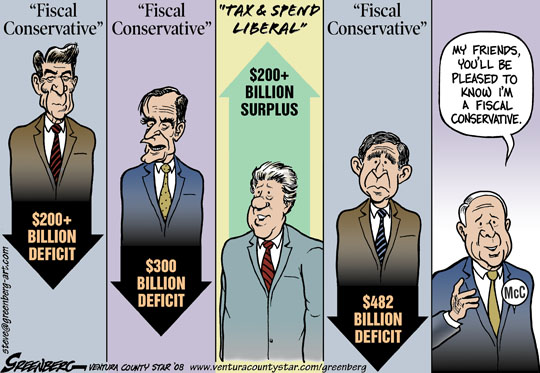i love this cartoon:

Especially in light of McCain's latest attack ad on Obama. He draws some pretty silly conclusions - Higher Taxes, More Government - means Fewer Jobs. I seem to remember that the New Deal started off with a few of those things, but ended up providing *more* jobs. Of course, that's only relevant if you believe that Obama is going to do those things.
Republican economic policy has been a failure for over thirty years. There's no reason to believe that it will work now. Time to move away from these failed policies (oh.. how much better off are we now that we all got those "rebate checks?") and find some real solutions.

Especially in light of McCain's latest attack ad on Obama. He draws some pretty silly conclusions - Higher Taxes, More Government - means Fewer Jobs. I seem to remember that the New Deal started off with a few of those things, but ended up providing *more* jobs. Of course, that's only relevant if you believe that Obama is going to do those things.
Republican economic policy has been a failure for over thirty years. There's no reason to believe that it will work now. Time to move away from these failed policies (oh.. how much better off are we now that we all got those "rebate checks?") and find some real solutions.

5 Comments:
Agreed. The rebate checks were a stupid waste of money. And the "chart" shown here in the political cartoon embarrasses me about my party--that the biggest spender in recent history is GWB. However, didn't all the presidents depicted here preside over a Congress controlled by the OTHER party? So, if that's true, I could argue that all the GOP presidents overspent due to a democratically controlled congress, while Billy was reigned in by having the GOP in control of BOTH houses in 1994 (if memory serves me correctly). Please correct me, if mistaken. I don't claim to be an excellent student of economics, but am fascinated by the topic. . .
An quick perusal of the last four Houses of Congress shows that the Republicans had a majority in both the House and the Senate for the first three sessions of Bush's (43) presidency. So, all the programs, spending and such happened during a completely Republican controlled government.
The 103rd Session was Clinton's first two years (both houses), and had a Democratic majority. The next three sessions had a Republican majority in both houses.
41 had a Democratic Majority in both houses for both terms of Congress.
Reagon had a mixed house for most of his term - Republicans controlled the Senate, the Dems the House of Representatives.
I don't think there's really any conclusion to be drawn by this - Reagan increased the debt with a mixed house for three of his four sessions, Bush increased the debt more than anyone with a Republican house for three of his four terms. Clinton had Republican majority three of his four terms and the debt decreased.
I think the agenda set by the President and his administration has a lot more influence than the make up the Congress.
Thanks for responding, I didn't know if an older post would garner attention.
Reagan inherited an economic mess from Carter. Lot's of people seem to like "Reaganomics" that ended the stagflation that was plaguing the nation at the time. So, that seems to jive with your last comment that the presidential agenda has more influence than the congress.
Help me out here, this is where I've struggled for a while in how our government works. Aren't spending bills drafted in Congress? (Further, aren't appropriation bills originated in the House of Reps?) So, in the end, the Pres just signs budgets and spending bills he agrees with, or vetoes bills he disagrees with? Therefore, if a president has an agenda, but the congress disagrees, can't the Congress do whatever it wants?
Thus we go back to my original question--were the congresses under the aforementioned presidents to blame/thank for the resulting spending?
I could probably find all this out on Wikipedia, but I enjoy talking to others, esp those on the other side of the aisle to get some additional perspective, not just academic answers on the mechanics of government spending.
You're right. A quick search for US Budget Process turned this up:
http://en.wikipedia.org/wiki/United_States_budget_process
As you'll see - it starts with the President's budget request.
As far as your question goes - I know that Presidents set the agenda for the country, and push legislation through Congress. I think an interesting read is here:
http://www.cedarcomm.com/~stevelm1/usdebt.htm
He discusses the relationship of who controls Congress with who the President was.
It's interesting to note that I was convinced that no matter who won the 1988 Election, Bush or Dukakis, would be a one term President. "Reaganomics" propped up the economy artificially, in a way that was not sustainable. Of course, we know what happened. Reagan's economic plan more than likely was the single biggest reason that Clinton was elected.
So much for your claim regarding which party drives bigger deficits (and hence, the national debt):
"Mr. Obama's $3.6 trillion budget blueprint, by his own admission, redefines the role of government in our economy and society. The budget more than doubles the national debt held by the public, adding more to the debt than all previous presidents -- from George Washington to George W. Bush -- combined. "
The above is from our friends at the WSJ.
Enjoy the spending spree. YOU voted for it.
Post a Comment
<< Home